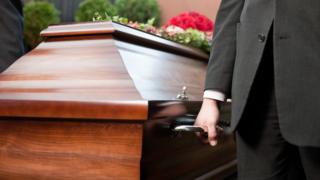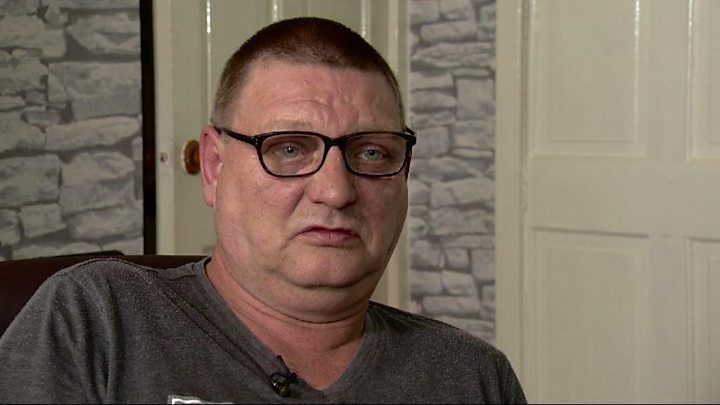 Image copyright
Getty Images
Image copyright
Getty Images
The basic cost of a burial in Scotland has risen on average by 75% since 2010, BBC Scotland research has revealed.
A recent Citizens Advice Scotland review said of the 55,000 funerals taking place in Scotland each year 10% of families struggle to pay the bill.
Jim Brodie, of the Scottish Association of Independent Funeral Directors, believed council charges for interment and cremations were "immoral".
Local government body Cosla said fees were based on "need and circumstance".
The average cost of a funeral in Scotland is £3,600, and one 2017 report - The Royal London National Funeral Cost Index 2017 - estimated that the average debt being taken on was £1,680.
- What are some of the terms associated with funerals? The excavation of a grave is known as the "interment" or "opening" fee, and the reservation of a plot is typically called the "lair purchase fee".
New data - obtained by BBC Scotland through a series of freedom of information requests - showed that the basic cost for an interment varied between £310 in the Western Isles to £1,780 in Stirling, with the Scottish average being £730 - a rise of 75% in eight years.
As well as the cost of the interment, there will be fees for the lair, the service, flowers, music, or higher charges for a weekend burial.
By comparison, the average fee for a cremation across 14 local authorities also increased by 46% to £685 over the same period.
However, this average national increase for burials hides more alarming trends across Scotland's local authorities.
In Shetland, interment fees have increased by 355% from £110 to £500 since 2010 and in South Lanarkshire and East Renfrewshire the charge has risen by 151% and 136% respectively.
Funeral costs in Scotland
£3,600
Average total cost
£1,680
Average debt incurred
-
£730 Average interment cost
-
£310 Western Isles interment cost
-
£1,780 Stirling interment cost
Mr Brodie said grieving families were being subjected to a "postcode lottery" because of the variety of fees being levied by the country's 32 councils.
He told the BBC: "Many councils will tell us that they lose money on these fees - however we find it difficult to understand why that is so.
"But when you're talking how a burial can cost nearly as much as an entire funeral - it seems a little bit strange.
"In my mind, it's as much as they think their community can afford.
Mr Brodie, who claims his funeral company has not raised service costs since 2015, added: "There are many pressures on the councils, I have no doubts about that, but you have an essential service that is being used to make money, to offset other parts of the council.
"I can't say it's wrong - I just think it's immoral."
Five interesting additional costs
- Pay an additional £67 to Dundee Council for "extra depth"
- Music for a cremation service by Falkirk Council will cost you an additional £147
- East Renfrewshire charges a different amount for a "Hebrew Interment"
- Permission from Dundee Council to scatter ashes will set you back £47
- But Midlothian Council charges nothing for the burial of a body organ
'I couldn't grieve for my mum'

Former kitchen worker Gordon has been left in debt following the death of his mother Lilias.
Three years ago he gave up work to look after his mother who had dementia.
When the 78-year-old went into hospital last August, Gordon lost his carer's allowance and immediately found himself struggling to pay bills.
Within weeks Lilias had died and he began planning her funeral
He thought her insurance would cover the cost and that the Department of Work and Pensions (DWP) would pay much of the remainder.
I was trying to grieve for my mum, but I couldn't grieve because I had all this in the back of my head
Gordon said: "I was trying to grieve for my mum, but at the end of the day I couldn't grieve for my mum, because I had all this in the back of my head."
He shopped around to find the cheapest deal. A basic funeral with two cars and a service cost him £3,100. His relatives paid the £200 floral cost and after the service his family went to his flat in Muirhouse for tea, biscuits and sandwiches.
His mother had an insurance policy which paid £1,500 but that left him with the £1,600 balance.
The DWP - which people can apply to for funeral expenses payments - said he was not eligible for help.
These payments can help to pay for burial fees and travel costs, as well as up to an additional £700 for other miscellaneous expenses such as funeral director's fees, flowers or the coffin.
Handouts from a food bank have helped Gordon to get by and his relatives help him with food.
Gordon is hoping to return to work soon, meanwhile he lives on about £100 a month after he's paid his rent and bills.
He said not being able to pay the funeral bill whilst grieving was "really stressful", just "brutal".
What are councils arguing?
- Shetland Islands Council said: "The reason for the increase is to bring Shetland up to a similar cost to other comparable areas in Scotland. With regard to families who cannot afford funeral costs, we offer payment by instalments."
- South Lanarkshire Council's Alistair McKinnon said: "Burial costs were increased between 2010 and 2015 in South Lanarkshire, with no increases in charges since then, and these increases enabled necessary investment to be made in the cemeteries service including extension to cemeteries and improvements in the general infrastructure throughout South Lanarkshire."
- East Renfrewshire Council said: "As part of our annual review of service charges it was identified that burial charges within the area were well below the national average. A full benchmarking exercise of all other councils charges for this service was undertaken and our charges have now been increased to bring them more in line with the national average."
Glasgow and Aberdeen councils have increased the cost of an interment by 12% and 18% respectively. A spokesman for Glasgow said the authority was "mindful" that funerals were expensive and that it tried to balance that with the "cost of providing a service and the need to invest in our facilities".
Cosla, the umbrella body for Scotland's councils, said fees for "any local government service" was a matter for "local determination based on need and circumstance".
A spokesman added: "Cosla fully recognises that this is a sensitive issue and would be happy to work with Scottish government and those involved in the funeral business to consider whether any general guidance around the issue may be useful.
"We are also working with the Scottish government on funeral expense allowances, part of newly devolved social security powers, that will help low income families better manage the costs they face."
Payday loans
Communities Secretary Angela Constance said the Scottish government was "absolutely determined to tackle funeral poverty in Scotland".
She said: "Next year we'll introduce the new funeral expenses payment - that's us using our new social security powers to widen the eligibility for those who are currently entitled to that benefit. We will invest an additional £3m into funeral expenses assistance."
Because of growing concerns, the government conducted a review of funeral costs and consequently accepted a recommendation for the creation of an affordable direct cremation service - that led to Caledonian Cremations.
- What is a direct cremation? It is where the dead person is taken to the crematorium from a funeral home for a simple cremation where there is no service.
John Halliday, co-founder of Scotland's first not-for-profit funeral directors, said: "When funeral poverty hits people, it hits people right at the time that they are bereaved.
"For many people, the cost of someone else's funeral might be the biggest purchase someone ever makes in their whole life."
Mr Halliday said that many people have been forced to go into credit card debt, take payday loans, and borrow from friends and family.
He added: "The causes of funeral poverty are complicated, but the solutions don't have to be."
Caledonian Cremations charges about £1,000 for a direct cremation - about £600 less than the average cost.
Unclaimed bodies
Additional figures obtained by the BBC showed that Greater Glasgow currently has 25 unclaimed bodies in their mortuaries aged between 20 and 70-plus.
Mr Brodie believes that rising funeral costs have played a part regarding this issue.
Greater Glasgow has six women and 19 men - eight have been identified but have not been buried due to either "family disputes or cost".
Three of these bodies have been in the mortuary for more than a year - one of them having lain for 671 days.
Health boards said that bodies are generally considered unclaimed if no funeral director or next of kin has been in touch after three weeks.
Mr Brodie said: "The hospital has a duty to try and find that person - it can take weeks, it can take months. However because of affordability problems, even after this person has been found, they don't have to take responsibility."
| Increases in interment costs by local authority | |||
|---|---|---|---|
| Council | 2010/11 | 2017/18 | Increase (%) |
| Aberdeen | £490 | £577 | 12% |
| Aberdeenshire | £430 | £684 | 59% |
| Angus | £471 | £631 | 34% |
| Argyll and Bute | £430 | £653 | 52% |
| Clackmannanshire | £395 | £834 | 111% |
| Dumfries and Galloway | £402 | £857 | 113% |
| Dundee | £420 | £545 | 24% |
| East Ayrshire | N/A | £500 | N/A |
| East Dunbartonshire | £541 | £967 | 79% |
| East Lothian | £437 | £765 | 75% |
| East Renfrewshire | £288 | £680 | 136% |
| Edinburgh | £812 | £1095 | 35% |
| Falkirk | N/A | N/A | N/A |
| Fife | £440 | £600 | 36% |
| Glasgow | £792 | £890 | 12% |
| Highland | £445 | £904 | 103% |
| Inverclyde | £456 | £615 | 35% |
| Midlothian | £465 | £634 | 36% |
| Moray | £373 | £836 | 124% |
| North Ayrshire | £375 | £570 | 52% |
| North Lanarkshire | £364 | £845 | 132% |
| Orkney Islands | £289 | £531 | 84% |
| Perth and Kinross | £661 | £891 | 35% |
| Renfrewshire | £296 | £467 | 58% |
| Scottish Borders | £408 | £717 | 76% |
| Shetland Islands | £110 | £500 | 355% |
| South Ayrshire | £494 | £751 | 52% |
| South Lanarkshire | £335 | £842 | 151% |
| Stirling | £862 | £1780 | 106% |
| West Dunbartonshire | £475 | £616 | 30% |
| West Lothian | £409 | £532 | 30% |
| Western Isles | £262 | £310 | 18% |